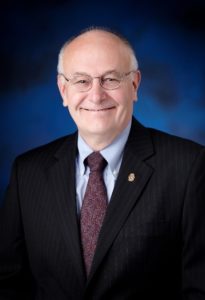
Door Opens For Condoning Respondents’ Snubbing Of Citations To Discover Assets
Litigation Law Roundup
Sharp  Thinking
Thinking
No. 142 Perspectives on Developments in the Law from Sharp-Hundley Law Firm, P.C. February 2017
Door Opens For Condoning Respondents’
Snubbing Of Citations To Discover Assets
By John T. Hundley, john@sharp-hundley.com, 618-242-0200
The Appellate Court in Chicago last month issued an opinion that sets the stage for widespread condoning of supplementary proceeding respondents’ ignoring of supplementary proceedings papers.
Ruling in R&J Const. Supply Co. v. Adamsuk, 2017 IL App (1st) 160778, a panel of that court allowed vacation under 735 ILCS 5/2-1401 of a final citation judgment granted after the respondent  ignored both the original citation to discover assets and a summons to confirm the conditional judgment.
ignored both the original citation to discover assets and a summons to confirm the conditional judgment.
Among other things, the court said a § 2-1401 petition “invokes the equitable powers of the court, which should prevent the enforcement of a judgment when it would be unfair, unjust, or unconscionable.” It said that “equitable powers may require that a judgment be set aside even in the absence of due diligence by a party seeking section 2-1401 relief.”
In Adamsuk, the citation respondent said it ignored the citation and the summons to confirm because it did not know and had no relation with the judgment debtor. The correctness of that contention seems to have colored the court’s judgment. But given the clarity with which a citation warns the respondent of the consequences of ignoring it, it seems difficult to argue that equity should save the respondent from the effects of his own actions.
The court relied upon other grounds as well, but these too are  dubious. It said that “[b]efore a judgment creditor may proceed against a third party who is not the judgment debtor, the record must contain some evidence that the third party possesses assets of the judgment debtor.” Whatever the correctness of that language where the respondent appears, denies holding assets and makes the proceeding contested, it ignores the extremely low barrier which the Supreme Court has established for issuance of a citation. See Supreme Court Rule 277 (“The proceeding may be against . . . any third party the judgment creditor believes has property of or is indebted to the judgment debtor. . . . The clerk shall issue a citation upon oral request”) (emphasis added). And the opinion offers no rationale for why lower courts are empowered to disregard what the Supreme Court has written.
dubious. It said that “[b]efore a judgment creditor may proceed against a third party who is not the judgment debtor, the record must contain some evidence that the third party possesses assets of the judgment debtor.” Whatever the correctness of that language where the respondent appears, denies holding assets and makes the proceeding contested, it ignores the extremely low barrier which the Supreme Court has established for issuance of a citation. See Supreme Court Rule 277 (“The proceeding may be against . . . any third party the judgment creditor believes has property of or is indebted to the judgment debtor. . . . The clerk shall issue a citation upon oral request”) (emphasis added). And the opinion offers no rationale for why lower courts are empowered to disregard what the Supreme Court has written.
Finally, the panel relied upon the fact that the citation papers mistakenly listed the respondent’s name in locations where the judgment debtor’s name should have appeared. This made the citation “defective on its face”, sufficient to void the papers, the court said. The court would have a point if it were dealing with a garnishment, which is derived from a statute where the strict construction rule applied. But citation procedure is part of the Civil Practice Act, to which the liberal construction rule applies. The propriety of allowing the respondent to snub its nose at the court in such context is much more dubious.
Partial Ownership Change Doesn’t Prevent Successor Liability
That there has been a partial change of ownership between the previous corporation and the present entity does not prevent imposing successor liability on the latter, the Seventh Circuit Court of Appeals has ruled.
Applying state law to an Internal Revenue Service levy upon the new corporation for the tax liability of the old, the court said Illinois law provides that a complete change of ownership prevents a finding of successorship but that complete identity of ownership is not essential to find successor liability. Eriem Surgical, Inc. v. United States, 843 F.3d 1160 (7th Cir. 2016).
In Eriem, the alleged successor was incorporated the same day as the predecessor went out of business; it took over the same office space and hired the predecessor’s employees; and it used the predecessor’s trademark in the same line of business. To avoid liability under Illinois’ multi-factor test for successor liability, the successor hung its hat on an alleged change in ownership: President Bernhard Teitz owned 40% of the predecessor and none of the successor, which was wholly owned by his wife. Treating the wife as a proxy owner for her husband, the court found that the difference between 40% and 100% was not determinative.
“The district court’s conclusion that [successor] is still conducting the [predecessor’s] business is not clearly erroneous,” the court said.
Court Vacates Ruling On Laymen In Administrative Hearings
A majority of the Illinois Supreme Court has vacated that part of Stone St. Partners, LLC v. City of Chicago Dep’t of Administrative Hearings, 2014 IL App (1st) 123654, which ruled that laymen could not represent business entities in Chicago administrative proceedings.
Ruling in Stone St. Partners, LLC v. City of Chicago Dep’t of Administrative Hearings, 2017 IL 117720, the Supreme Court this month affirmed the Appellate Court judgment but said that reaching the unauthorized practice of law issue was “not necessary to the disposition of the case” and thus comments concerning that issue by the Appellate Court were improper and “wholly advisory.” The majority held that there was no evidence that the person at issue had any authority from the Stone St. organization and hence he was powerless to waive service over it whether he was a lawyer or not.
Three justices dissented and would have ruled that that the layman could represent the limited liability company in the administrative proceeding and that by appearing at the hearing he waived objection to the City’s failure to give jurisdictional notice to the LLC.
SHARP-HUNDLEY, P.C.
1115 Harrison, P.O. Box 906, Mt. Vernon, IL 62864 • Telephone 618-242-0200 • Facsimile 618-242-1170
www.sharp-hundley.com
Business Transactions • Litigation • Financial Law • Real Estate • Corporate Law • Commercial Disputes • Creditors’
Rights • Arbitration & Mediation • Estate Planning • Probate
142
